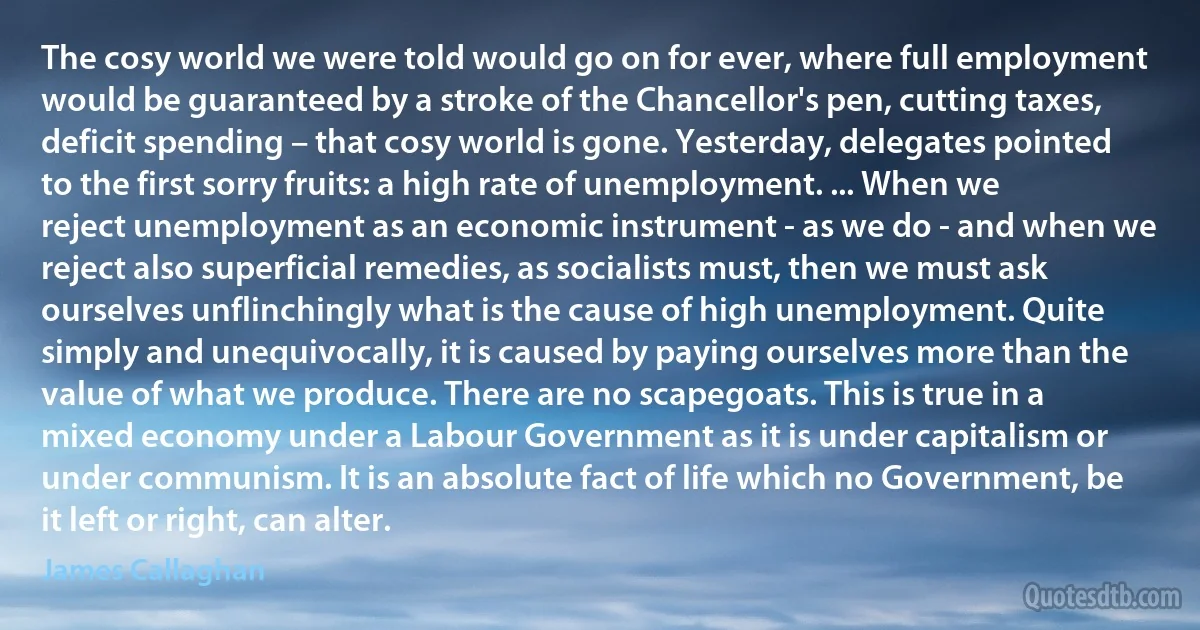
The cosy world we were told would go on for ever, where full employment would be guaranteed by a stroke of the Chancellor's pen, cutting taxes, deficit spending – that cosy world is gone. Yesterday, delegates pointed to the first sorry fruits: a high rate of unemployment. ... When we reject unemployment as an economic instrument - as we do - and when we reject also superficial remedies, as socialists must, then we must ask ourselves unflinchingly what is the cause of high unemployment. Quite simply and unequivocally, it is caused by paying ourselves more than the value of what we produce. There are no scapegoats. This is true in a mixed economy under a Labour Government as it is under capitalism or under communism. It is an absolute fact of life which no Government, be it left or right, can alter.
James CallaghanRelated topics
ask cause cutting deficit full government high left life pen produce quite right sorry spending stroke superficial tax tell under value world yesterday labourRelated quotes
First, most producers are employees of firms, not owners. Viewed from the vantage point of classical [economic] theory, they have no reason to maximize the profits of firms, except to the extent that they can be controlled by owners. Moreover, profit-making firms, nonprofit organizations, and bureaucratic organizations all have exactly the same problem of inducing their employees to work toward organizational goals. There is no reason, a priori, why it should be easier (or harder) to produce this motivation in organizations aimed at maximizing profits than in organizations with different goals. If it is true in an organizational economy that organizations motivated by profits will be more efficient than other organizations, additional postulates will have to be introduced to account for it.

Herbert Simon
Our call is to young India. It is the young who must be the builders of the new world,.. not those who accept the competitive individualism, the capitalism or the materialistic communism of the West as India's future ideal, not those who are enslaved to old religious formulas and cannot believe in the acceptance and transformation of life by the spirit, but all who are free in mind and heart to accept a completer truth and labour for a greater ideal.... It is with a confident trust in the spirit that inspires us that we take our place among the standard-bearers of the new humanity that is struggling to be born amidst the chaos of a world in dissolution, and of the future India, the greater India of the rebirth that is to rejuvenate the mighty outworn body of the ancient Mother.84.

Sri Aurobindo
It takes a full sixty years for the Cold Arrow Bamboo to go through the cycle of flowering, seeding, dying and for the seeds to sprout, grow, and flower. According to Buddhist teachings on transmigration this would be exactly one kalpa. "Man follows earth, earth follows sky, sky follows the way, the way follows nature, don't commit actions which go against the basic character of nature, don't commit acts which should not be committed." "Then what scientific value is there in saving the giant panda?" I ask. "It's symbolic, it's a sort of reassurance―people need to deceive themselves. We are preoccupied with saving a species which no longer has the capacity for survival and yet on the other hand we're changing ahead and destroying the very environment for the survival of the human species itself."

Gao Xingjian
...that Chancellor of the Exchequer is the very man who comes down to corrupt whatever there is of financial virtue in us, and to instil into our minds those seductive and poisonous ideas that it does not, after all, matter very much if there is a deficit, and that it is extremely disagreeable when commerce is not in the most flourishing state to call upon the people to pay. Was that the practice of Sir Robert Peel? ... he came to Parliament and stood at his place in the House of Commons, pointed out the figures as they stood, and said to them-I ask you, will you resort to the "miserable expedient" of tolerating deficit, and of making provision by loans from year to year? That which he denounced as the "miserable expedient" has become the standing law, has become almost the financial gospel of the Government that is now in power.

William Ewart Gladstone
A final aspect of all open access orders is Schumpeter's notion of creative destruction, one of the most powerful descriptions of a competitive, open access economy. When Schumpeter wrote Capitalism, Socialism, and Democracy in the early 1940s, the economic theory of perfect competition among atomistic firms (i. e., firms too small to have market power) had come under sustained attack as unrealistic. Large and powerful economic organizations dominated the new economy, and their behavior did not match the textbooks. Despite this dominance, the economy produced historically unprecedented, sustained economic development. Schumpeter asked, How could large businesses that were supposed to choke off competition and growth nonetheless generate such spectacular productivity increases in a world that seemed ever more competitive?

Douglass North
